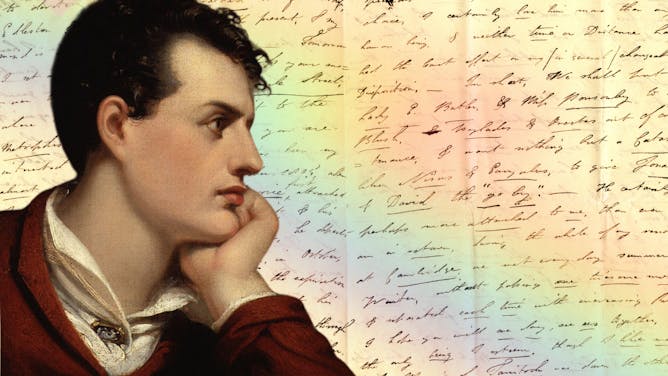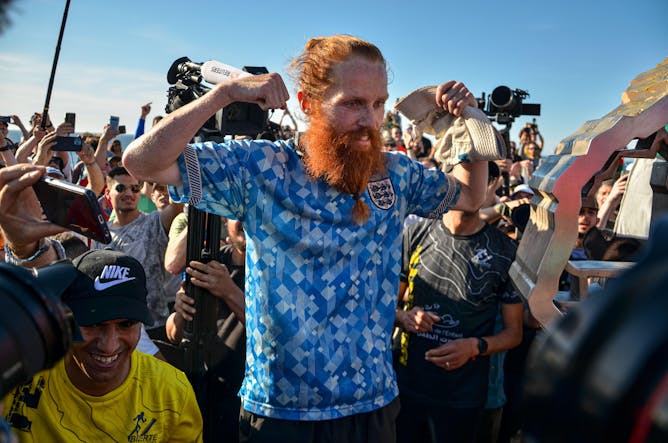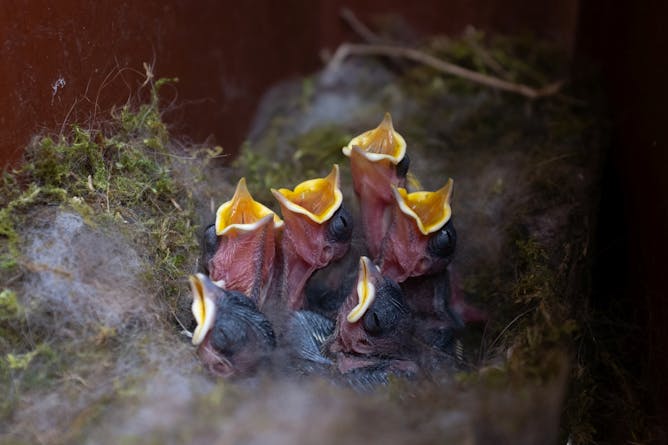|
Reading about Lord Byron – the Romantic poet infamously dubbed ‘mad, bad and dangerous to know'– you’d be forgiven for thinking he was more myth than man. There’s the pet bear he kept at Cambridge after the university banned dogs, the skulls from his family crypt that he used as flower pots – and, of course, the rumours of his myriad affairs.
One of the reasons hard facts about the poet are so difficult to come by is that his memoirs were burned after his death. But, fortunately, we do have many of his letters. In this long read, expert in LGBT+ literary history Sam Hirst pieces together what they tell us about the queer romance – and heartbreak – that inspired Byron’s poetry.
To turn from one eccentric to another, Russ Cook is a 27-year-old British man who has recently accomplished the astonishing feat of running the length of Africa. Exercise expert Dan Gordon explains the effect this gruelling stunt (equivalent to running 385 marathons back-to-back) has on the human body.
And while Cook’s physical adaptation was voluntary, some animals have no choice but to change to cope with extreme conditions. Take these Oxfordshire birds as an example.
If you’ve been asked by a child to explain, I don’t know, what dark matter is 🤯, how eye colour is made 🤔 or how much money there is in the world 😬, then you’ll be as excited and relieved to hear about the new Curious Kids podcast we’re launching in association with the Fun Kids radio station next Sunday! We’re so eager we made a trailer 🚀 and we’d love for you to have a listen.
|

|
Anna Walker
Senior Arts + Culture Editor
|
|

Byron and one of his moving letters to Edleston.
Letter courtesy of Newstead Abbey. Image made with Canva.
Sam Hirst, University of Nottingham
Letters from Byron to his best friend Elizabeth reveal the intense emotions of one of his first queer relationships.
|

Russ Cook’s feat took 352 days to complete.
Associated Press / Alamy Stock Photo
Dan Gordon, Anglia Ruskin University
‘HardestGeezer’s’ 16,000km feat highlights the remarkable capabilities of what the human body can endure
|

DorSteffen/Shutterstock
David López Idiáquez, University of Oxford
Great tits being studied at a woodland near Oxford are adjusting the timings of their breeding season as the climate changes.
|

Gemma Ware, The Conversation
Listen to the trailer for The Conversation’s Curious Kids, a new podcast where kids get answers to their big questions from experts.
|
World
|
-
Elke Schwarz, Queen Mary University of London
Revelations by an investigative journalist that Israel is using AI to identify and target suspected Hamas members have shone a light on a frightening new aspect of warfare.
-
Emma Long, University of East Anglia
The ramifications of a US court case where parents of a school shooter have been prosecuted are explained by a legal expert.
-
Taku Tamaki, Loughborough University
The Shinkansen bullet train is symbolic of Japan’s position as a railway superpower.
|
|
Politics + Society
|
-
Matthew Wells, University of Manchester
Architectural models are an effective way of showing the public what new major buildings will look like.
-
Simon Usherwood, The Open University
The decade of negotiations was driven more by local political considerations, than by what might be best for refugees who have risked everything.
|
|
Arts + Culture
|
-
Daniel O'Brien, University of Essex
POV shots can be extremely effective, presenting an entirely new way of looking at a character, or their motivations.
|
|
Business + Economy
|
-
Alan Shipman, The Open University
A gap has opened up between inflation in the US compared to other regions like Europe and China.
|
|
Environment
|
-
William Austin, University of St Andrews
Blue carbon is stored in mangroves, seagrass and sediments. Discussions at the UN Ocean Decade conference reiterate the importance of preserving existing sea floor habitats, before it’s too late.
|
|
Health
|
-
Pouya Movahed Rad, Lund University
People with personality disorders more likely to have a bad trip on psychedelics.
|
|
Science + Technology
|
-
Nello Cristianini, University of Bath
Meta and OpenAI are working to incorporate planning abilities into their AI systems.
|
|
|
|
| |
|
|
8 March - 18 May 2024
•
Glasgow
|

|
18 - 19 April 2024
•
London
|

|
24 April 2024
•
Manchester
|

|
25 April 2024
•
Liverpool
|

|
|
|
|
| |
| |
| |
| |
| |
|
|